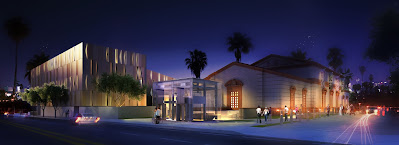We first visited the brand new Wallis Annenberg Center for the Performing Arts, fondly referred to as "The Wallis", shortly after it opened in October of 2013. It seems fitting that we should revisit it again, seven years later, now that it has become firmly entrenched in both the Beverly Hills and the Los Angeles, California cultural scenes.
When The Wallis was constructed, it transformed an entire city block in the heart of the Beverly Hills commercial district near the Civic Center into a vibrant cultural destination for artists and visitors from around the world and audiences of every age.
 |
| Exterior, The Wallis at night. Former Beverly Hills Post Office and new Performing Arts Center Photo credit: stageandcinema.com |
Its 2013-2014 Inaugural Season coincided with Beverly Hills' Centennial Celebration making the 100th birthday of the City's incorporation.
Consisting of two separate but connected buildings, the most notable of the two buildings which comprise the performing arts complex is the much-loved historic 1933 Italianate-style Beverly Hills Post Office which had been built during the Great Depression of the 1930s in the United States as a Works Progress Administration (WPA) project during the administration of President Franklin Delano Roosevelt. For decades, some of Beverly Hills' most recognizable residents from film and television kept post office boxes there, such as Fred Astaire and Jimmy Stewart.
In 2013, the City of Beverly Hills designated the Beverly Hills Post Office as a historical landmark under the City's Historic Preservation Ordinance. The building had previously received designation on the National Register of Historic Places by the US Department of the Interior.
 |
| Grand Lobby in former Beverly Hills Post Office Photo credit: stageandcinema.com |
A striking 70,000 sq. ft. building, The Wallis itself is an excellent example of "constructivism architecture", a futuristic-looking style which developed in the 1920s and 1930s in the former Soviet Union that combined technology and engineering, and applied a 3-dimensional Cubist vision to entire abstract non-objective constructions by adding a kinetic element.
 |
| Exterior façade of The Wallis at night Photo provenance unknown. |
The façade of The Wallis, comprised of fiber cement, is evocative of envelopes being sorted -- an homage to the historic Post Office on the same site. Designed by architect Zoltan E. Pali, The Wallis has garnered six architectural awards since it opened.
The interior space of The Wallis includes the contemporary 500-seat, state-of-the-art Bram Goldsmith Theatre and the 150-seat Lovelace Studio Theatre. Also on site is an open-air plaza for outdoor performances, and the GRoW@TheWallis, a space for arts education for all ages.
 |
| Goldsmith Theatre in The Wallis Photo provenance unknown. |
© 2021 Snobby Tours®, Inc. All Rights Reserved.
No comments:
Post a Comment
Note: Only a member of this blog may post a comment.